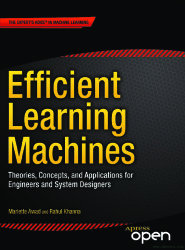Efficient Learning Machines
Mariette Awad and Rahul Khanna's synthetic approach weaves together the theoretical exposition, design principles, and practical applications of efficient machine learning. Their experiential emphasis, expressed in their close analysis of sample algorithms throughout the book, aims to equip engineers, students of engineering, and system designers to design and create new and more efficient machine learning systems. Readers of Efficient Learning Machines will learn how to recognize and analyze the problems that machine learning technology can solve for them, how to implement and deploy standard solutions to sample problems, and how to design new systems and solutions.
Advances in computing performance, storage, memory, unstructured information retrieval, and cloud computing have coevolved with a new generation of machine learning paradigms and big data analytics, which the authors present in the conceptual context of their traditional precursors. Awad and Khanna explore current developments in the deep learning techniques of deep neural networks, hierarchical temporal memory, and cortical algorithms.
Nature suggests sophisticated learning techniques that deploy simple rules to generate highly intelligent and organized behaviors with adaptive, evolutionary, and distributed properties. The authors examine the most popular biologically-inspired algorithms, together with a sample application to distributed datacenter management. They also discuss machine learning techniques for addressing problems of multi-objective optimization in which solutions in real-world systems are constrained and evaluated based on how well they perform with respect to multiple objectives in aggregate. Two chapters on support vector machines and their extensions focus on recent improvements to the classification and regression techniques at the core of machine learning.
Table of contents
- About the Authors
- About the Technical Reviewers
- Acknowledgments
- Chapter 1
- Chapter 2
- Chapter 3
- Chapter 4
- Chapter 5
- Chapter 6
- Chapter 7
- Chapter 8
- Chapter 9
- Chapter 10
- Chapter 11
- Index
| Pages : | 244 |
| Size : | 8.2 MB |
| File type : | |
| Downloads: | 111 |
| Created: | 2022-02-02 |
| License: | CC BY-NC-ND |
| Author(s): | Mariette Awad, Rahul Khanna |

Warning: Trying to access array offset on false in /home/tutovnfz/public_html/article.php on line 233
Others Computer science Tutorials
Others related eBooks about Efficient Learning Machines
Photoshop CS5 : Scripting guideDownload free Scripting Adobe Photoshop tutorial in PDF , a complete guide under 87 pages designated to intermediate level-users....
UWP SuccinctlyDownload free course UWP Succinctly, pdf file on 157 pages by Matteo Pagani....
Android on x86Android on x86: an Introduction to Optimizing for Intel Architecture serves two main purpo..., download free Android tutorial in PDF (380 pages) created by Iggy Krajci ....
Grid Computing - Technology and Applications, Widespread Coverage and New HorizonsGrid research, rooted in distributed and high performance computing, started in mid-to-late 1990s. Soon afterwards, national and international research and development authorities realized the importance of the Grid and gave it a primary position on their research and development agenda. The Grid ...
iOS App Reverse EngineeringThis book is the world's first book of very detailed iOS App reverse engineering skills, targeting 4 kinds of readers:...
Basic Encryption and DecryptionThis is a complet guide about encryption and decrytion data, free pdf tutorial in 37 pages for beginner's by H. Lee Kwang ....
Building Cloud Apps with Microsoft AzureDownload free course Building Cloud Apps with Microsoft Azure, pdf file on 201 pages by by Scott Guthrie, Mark Simms, Tom Dykstra, Rick Anderson, Mike Wasson....
Learning MongoDBDownload free course Learning MongoDB, pdf file on 86 pages by Stack Overflow Community....
Using Adobe Soundbouth CS5This PDF tutorial presents an understanding of key audio concepts helps you get the most out of Adobe Soundbooth CS5,download free training document for intermediat level-users....
Guide to NumPyNumPy is an extension of Python, which provides highly optimized arrays and numerical operations. NumPy replaces a lot of the functionality of Matlab and Mathematica specifically vectorized operations, but in contrast to those products is free and open source. In today's world of science and technol...